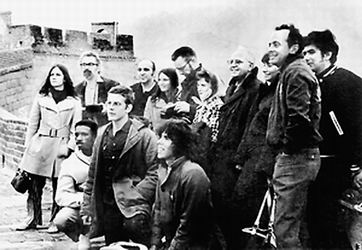From April 11 to 17, 1971, the US table tennis team, after attending the 31st World Table Tennis Championship in Nagoya, Japan, visited China at the invitation of the Chinese team, thus opening the door to Sino-US exchanges which had been shut close for 22 years. The move was praised as "Ping-Pong diplomacy" by the international media.
 |
|
The American table tennis team made a visit to the Great Wall [Xinhua]
|
During the world championship, the US team expressed its wish to visit China afterwards; and on April 6, when competitions were drawing to a close, Chairman Mao Zedong made his decision on the invitation.
On April 10, the United States Table Tennis Association President, the head of the US table tennis team and players arrived in Beijing. Premier Zhou Enlai made specific arrangements for the visit, pointing out the visit is a good opportunity to open up the prospect of Sino-US relations. This event had a significant impact on the breakthrough of the Sino-U.S. relations, known as "small ball propeling the big ball".
On April 14, Premier Zhou Enlai received the table tennis teams from the United States, Canada, Colombia and other countries in the Great Hall of the People, and held a long conversation with the US team. After that, the Chinese and the U.S. teams held a friendly match. The US team was also invited to tour the Great Wall, the Tsinghua University and other places. The same day, US President Richard Nixon issued a statement, adopting a series of measures on the improvement of relations between the two countries.